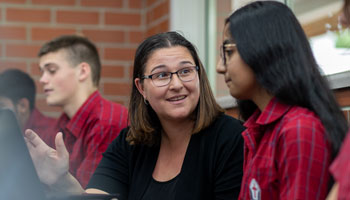Engage with these effective wellbeing tips to support your senior students, especially in times of unprecedented change.
The culmination of schooling is an important time for all students. This year is usually punctuated with an anticipated series of ‘lasts’ including school leadership, sports carnivals, tours and competitions, co-curricular activities, productions, a valedictory event, and possibly a formal.

Connection is one of the strongest protective factors and predictors of student wellbeing.
Supporting student autonomy, encouraging them to voice their needs and to problem solve can enhance their wellbeing outcomes.
With so many changes taking place this year, students may be feeling emotions including stress, fear, uncertainty, frustration, anger, and disappointment. It's important to let students know these feelings are normal and encourage them to seek help through your school’s internal wellbeing pathways (eg, wellbeing leaders, school counsellors/psychologists).
Student voice is deeply connected to resilience and wellbeing because it enhances a sense of belonging to their school community. Supporting student autonomy, encouraging them to voice their needs and to problem solve can enhance their wellbeing outcomes.

Schools can communicate clearly about ongoing changes to academic processes.
Keeping students connected
Despite the remote learning environment for many students, connection still remains one of the strongest protective factors and predictors of wellbeing, especially in times of change. Looking for opportunities to create connections with students for non-academic interactions can support students experiencing extended learning from home. This same connection to classroom teachers and wellbeing leaders is essential.
Engaging in daily or weekly acts of kindness can enable students to support others and to gain a sense of control. Participating and expressing gratitude can help students to refocus on the positives.
Calling upon and developing students’ wellbeing literacy through accessing external resources can support their self-efficacy, for example, Beyond Blue Youth, Head to Health, Office of the eSafety Commissioner, ReachOut or Smiling Mind. These resources can be found in the AISNSW Learning from Home Portal under the Whole-School Wellbeing section.
Engaging in daily or weekly acts of kindness can enable students to support others and to gain a sense of control. Participating and expressing gratitude can help students to refocus on the positives.

Student voice is deeply connected to resilience and wellbeing.
Focusing on personal successes (no matter how small) and long-term goals will support students’ sense of achievement and help maintain their wellbeing.
Schools can communicate clearly about ongoing changes to academic processes in addition to supporting students to focus on long-term goals rather than becoming preoccupied with short-term setbacks.
Focusing on personal successes (no matter how small) and long-term goals will support students’ sense of achievement and help maintain their wellbeing.
Creating a school legacy activity or item for which the ‘Class of 2021’ can be remembered will also support students to mark this final year of school when so many students are experiencing similar challenges.

Creating a school legacy activity for which the ‘Class of 2021’ can be remembered will also support students.
AISNSW Learning from Home Whole-school Wellbeing resources
All schools will be looking to support students to develop strategies for maintaining their own wellbeing. To add to this support, AISNSW has developed a Learning from Home Portal with a designated Whole-school Wellbeing section to support teachers, leaders, and families. Resources including infographics and factsheets are available for schools whether learning from home or on campus.
Please contact the AISNSW Wellbeing Consultants for further information.
Photo credits: With thanks to Bishop Druitt College, Brigidine College St Ives, Penrith Anglican College and Wollemi College.
New to AISNSW and want to receive AISNSW Education News updates? Click here to register, and select ‘AISNSW Education News’ on the Areas of Interest/Subscriptions page.
#Wellbeing